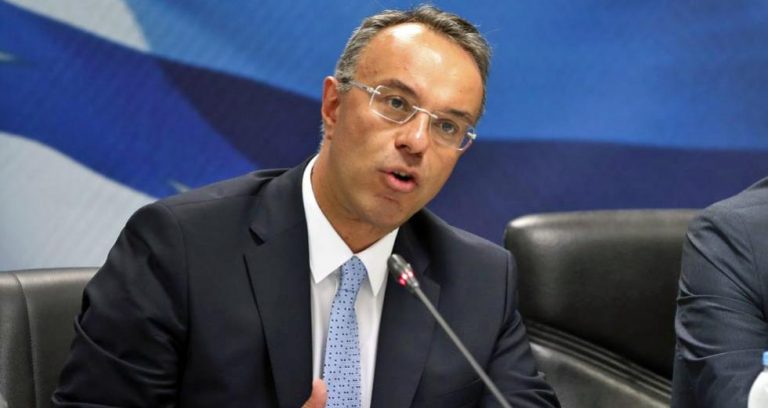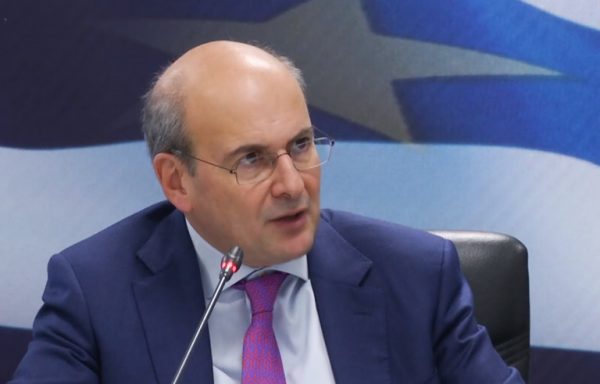
Τhe positive picture of the Greek economy is threatened by high inflation, due to soaring energy costs, the Greek Finance Minister, Mr Christos Staikouras told to SKAI channel. The minister stressed that the positive picture is shaped by tourism revenues which, if they continue to increase at the same pace, may exceed those of 2019. The very high number of new investments, the high number of hires, the shrinking unemployment rate and the increased tax revenues contribute to the positive course of the economy, as well.
In addition, he stressed, household deposits continued to grow in July.
He also added that very high inflation is nibbling away at the disposable income.
The fiscal space, created during the last two months, added Mr Staikouras, will be used to support citizens in the last quarter of the year and at the beginning of 2023.
Trends in revenues
Mr Staikouras also reiterated that we have to wait for the first week of September, when the last quarter’s GDP will be released, in order to better understand the general trends in revenues.
Only in this way, we are going to understand the fiscal margins of Greece, that will be used in order to help the citizens at the end of the year.
Attention to consumption
Then, he also stressed that gas constitutes a huge problem that requires a broader European solution, while he advised citizens to be careful with consumption.
“If prices remain high, more subsidies will be needed. Therefore, additional resources will be needed to support citizens,” he said, reiterating that the Greek government is going to support the Greeks for as long as needed.
He estimated, however, that the need for subsidies in the coming months would be less than that of August and September.
New subsidies for fuels
He also left open the possibility of new subsidies for fuels, with gas being their first priority.
Concerning the heating allowance, he said that the Greek government intends to give the same amount as last year. However, he stressed that “If gas prices increase further, the state budget should be larger in order to cover the costs”.
He also said that, in 2023, the Greek Prime Minister intends to abolish the solidarity levy for the Greek state and its pensioners (an intervention of 450 million).
He also said that a permanent increase in pensions is on the way, though he did not specify the amount.
As for the minimum wage, Mr Staikouras stressed that the institutional process will be followed, in the first half of 2023, in order to conclude to the final amount of the increase, without affecting businesses.
As far as tax cuts are concerned, he added that they are permanent and he also explained that: “We want fiscal stability with permanent tax cuts so as the citizens can afford their spending on their own”.
Latest News

First Step Towards New Audiovisual Industry Hub in Drama
The project is set to contribute to the further development of Greece’s film industry and establish Drama as an audiovisual hub in the region

Airbnb Greece – Initial CoS Ruling Deems Tax Circular Unlawful
The case reached the Council of State following annulment applications filed by the Panhellenic Federation of Property Owners (POMIDA)

Mitsotakis Unveils €1 Billion Plan for Housing, Pensioners, Public investments
Greek Prime Minister Kyriakos Mitsotakis has announced a new set of economic support measures, worth 1 billion euros, aiming to provide financial relief to citizens.

Alter Ego Ventures Invests in Pioneering Gaming Company ‘Couch Heroes’
Alter Ego Ventures' participation in the share capital of Couch Heroes marks yet another investment by the Alter Ego Media Group in innovative companies with a focus on technology.

Corruption Still Plagues Greece’s Driving Tests
While traffic accidents continue to claim lives on Greek roads daily, irregularities and under-the-table dealings in the training and testing of new drivers remain disturbingly widespread

Pope Francis Died of Stroke and Heart Failure Vatican Confirms
As news of the official cause of death spread, tributes poured in from across the globe. The 1.4 billion-member Catholic Church is united in grief, remembering a pope who championed inclusion, justice, and compassion

Increase in Both Museum Visits, Revenues for 2024
As expected, the Acropolis was the top archeological site in the country, followed by Sounion, Mycenae, the ancient theater of Epidaurus, and Vergina in northern Greece

Where Greece’s Tourists Come From: A Look at 2025’s Top Visitor Markets
The United Kingdom continues to hold the top spot as the largest source of incoming tourism, with 5.6 million seats booked for Greece this summer — up 2.2% from last year. This accounts for 20% of all international air traffic to Greece

Pope Francis: A Pontiff Who Reshaped the Papacy and Sparked a Global Conversation
His first words from the balcony of St. Peter’s Basilica—“Brothers and sisters, good evening”—set the tone for a pontificate that would challenge norms, favor mercy over dogma, and bring the papacy closer to the people.

When Blue Skies was Unmasked as ND’s Political ‘Slush Fund’
The fact that so many top New Democracy (ND) party cadres were paid by the firm Blue Skies, owned by Thomas Varvitsiotis and Yiannis Olympios, without ever citing this publicly, raises very serious moral issues, regardless of the legality











![Πλημμύρες: Σημειώθηκαν σε επίπεδα ρεκόρ στην Ευρώπη το 2024 [γράφημα]](https://www.ot.gr/wp-content/uploads/2025/04/FLOOD_HUNGRY-90x90.jpg)




![Ξενοδοχεία: Μεγάλο το ενδιαφέρον για επενδύσεις στην Ελλάδα – Η θέση της Αθήνας [γραφήματα]](https://www.ot.gr/wp-content/uploads/2025/03/Athens-hotels-90x90.jpg)
























 Αριθμός Πιστοποίησης
Αριθμός Πιστοποίησης